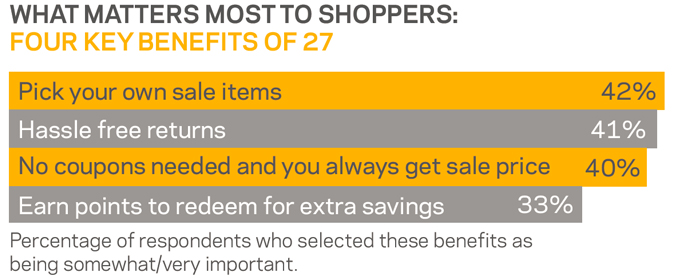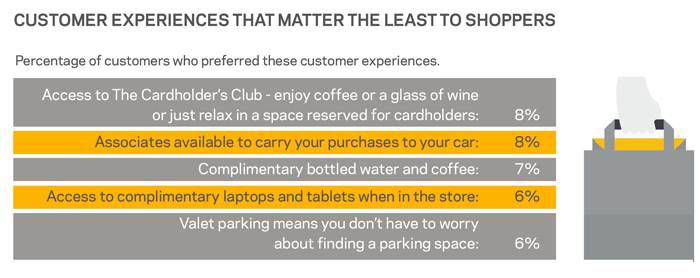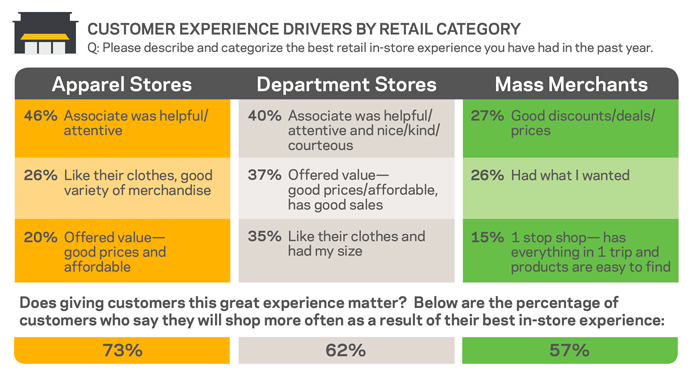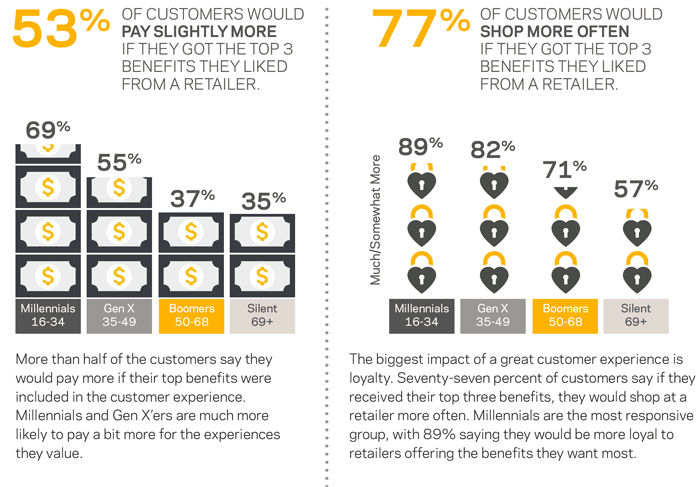What Matters Most To Retail Shoppers?

A great experience trumps great prices. Surprised? Don’t be. Brand new research from Synchrony Financial gives retailers the concrete evidence they need to prove that building a unique customer experience is essential to creating long-term and profitable relationships with consumers, and shows retailers how to do it.
There’s no denying the fact that price has always been — and will remain — a key motivator in customers’ individual decisions about where they’ll shop. But when it comes to building long-term relationships with customers, merchants can benefit far more from building a unique customer experience.
The question is, how?
A new survey from Synchrony Financial — “The Retail Customer Experience” — quantifies what customers value most (and least) from their retailer, and how strongly those factors drive their behavior, giving retailers a valuable roadmap for building customer loyalty.
How The Customer Experience Impacts Shopping Behavior
The Synchrony Financial white paper offers a number of detailed examples that show how retailers can give their consumers a great customer experience, including:
– Giving the consumer more control over his or her shopping experience with a loyalty program that allows consumer to decide how and when to use accumulated points
– Turning stress into peace of mind with an easy return policy
– Removing shopping hassles by automatically applying coupons and discounts to purchases
4 Key Findings
Of the 27 retail customer experiences that the Synchrony Financial survey investigated, 4 emerged as the most valuable.
Customers want to feel valued and make their lives easier

Retailers can deliver that benefit by giving consumers:
– The ability to pick their own sale items (it was the highest-rated item in survey at 42 percent).
– Hassle-free returns — meaning no time limit, no need for a receipt, and free postage (in the case of mail-order purchases).
– The best prices without presenting coupons. Synchrony points out that this benefit can be applied to retail credit card value propositions that include “best price” programs, particularly in the case of premium customers.
– The ability to redeem loyalty points for savings. Over one-third of respondents to the Synchrony survey said that points programs were important to them for the extra savings or gift cards that they generate; retailers who offer such benefits will often find that they lead customers to spend more.
Retailers need to discover which experiences do not matter to customers, in order to focus on areas they value.

The things that consumers value least include: valet parking; access to complimentary tablets and laptops in-store; and complimentary bottled water and coffee. It would appear, then, that tangential add-ons in the retail space are not widely regarded as integral to the customer experience.
Factors determining a positive customer experience vary by retail category

For retailers, especially for those who operate apparel stores, the most important factor was a helpful/attentive associate (46 percent).
That was also the top answer (40 percent) regarding department stores; however, value was cited as a much higher priority in this category (37 percent) than it was in apparel stores (20 percent).
In the category of mass merchants, good discounts/deals/prices were cited as the top factor (27 percent), but it’s worth noting that the third highest-ranking factory in the category — one-stop shopping (15 percent) — did not even make the Top 3 factors in the other two categories.
Finding and implementing the top experiences your customers value does have an impact on their behavior.

Retailers should note that 53 percent of customers who responded to the survey would pay slightly more if they got the Top 3 benefits they liked from a retailer. That response was even higher among millennials, at 69 percent.
The survey also shows that 77 percent of customers would shop more often at retailer that provided their Top 3 benefits. The number was, again, even higher for millennials, at 89 percent.
The takeaway from this element of the survey is clearly that the biggest impact of a great customer experience is loyalty.
Conclusion
It seems pretty conclusive: The customer experience matters, and the most compelling experiences do drive increased spend and loyalty. Giving customers what they want doesn’t have to be expensive, but it needs to be relevant. Retailers who are successful often implement differentiated experiences to simplify the lives of their customers and make them feel valued.
“The key,” concludes Synchrony, “is to find out what your customers want and give it to them.”
Get started by downloading the complete white paper — “The Retail Customer Experience” by clicking the button below…
Methodology
The Synchrony Financial Customer Experience and Impact study was conducted online May 22-26, 2015. The 1,003 participants were sourced from a national panel. Surveyees had to be 18 years of age or older and must have shopped in at least one of a list of 35 retailers in the past 12 months.
